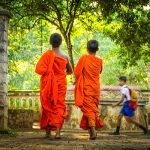Sri Lanka is a multi-ethnic country where a variety of religions are being practiced and as a result, more festivals are observed. From the Portuguese to the Arabs, British and Indian rulers that have been in control of Sri Lanka for several centuries, their influence on the people of Ceylon has been significant. As a result, there are vast communities of different religions that are thriving in Sri Lanka. While Buddhism is the majority, there are also Hindu, Tamil, Muslim, Christian, Burger, and Malay cultures that are highly prevalent in Sri Lanka.
Let us look at the calendar of festivals in Sri Lanka to give you an idea of the cultural diversity in the country.
The Calendar of Festivals for 2022 in Sri Lanka
Sinhala and Tamil New Year
Celebration date & time: April 13th and 14th of every year.
Who celebrates it? The Buddhist and Tamil followers celebrate their New Year during this period.
Significance of the festival: Also known as the “Aluth Avuruddu”, many Sinhala and Hindu households celebrate this festival where the sun moves from Pisces to Aeries, marking the end of the harvesting season. This well-celebrated festival brings together Sri Lankans from many parts of the world.
Customs and Traditions: There is a time slot between the ending of the old year and the dawning of the new year, during which religious ceremonies are performed. Buddhists are seen all dressed in white, heading towards neighboring temples to seek blessings from their monks.
Preparations for the Sinhala and Tamil New Year include cleaning the house, refurbishing it, and buying new clothes to be worn on the auspicious occasion.
Food and Beverages: Traditional sweetmeats such as Kavum, Kokis, milk rice, milk toffee, and many more are made to be served to family and visitors. At the auspicious time, a clay pot is used to boil milk, and letting the milk spill over the pot is a sign of prosperity and good luck for members of the household.
This year, the 13th of April is on a Wednesday, but the norm for this festival is a week-long holiday for everyone in Sri Lanka. So, while Wednesday, 13th, and Thursday 14th will be official holidays, many who have to travel to rural villages to visit their families will most likely take the entire week off to do so.
Poya Days
Every month has one full moon day, which is known as Poya in Sri Lanka and is offered as public holidays and bank holidays across the country. Traditionally, Buddhists visit the temple for prayers every Poya Day, and in addition to that, no alcohol is served anywhere, cinemas are closed, and meat cannot be sold on this day every month.
Certain months have special Poya days where celebrations with processions, lights, and lanterns can be seen.
- At the start of every year, January’s Poya is known as Duruthu full moon Poya day and marks the first visit of Lord Buddha to the island of Sri Lanka, 25 centuries ago.
- In the month of May, there is the Vesak Poya – the most popular in Sri Lanka where every Buddhist home, as well as much of the streets, are lighted up with pretty lanterns in all sorts of colors.
- Poison Poya comes in the month of June and marks the day that Buddhism was introduced to Sri Lanka in the 3rd Century BC.
- Esala and Nikini Poya are the names given to the full moon days in the month of July and August. This is when the Esala Perahera (Grand Procession) takes place in Kandy, in honor of the sacred Tooth Relic.
Thai Pongal
Celebration date & time: January is the 10th month of the Tamil calendar, known as “Thai”. Every year’s calendar points out a particular date somewhere in Mid-January (between the 13th to 18th) for the celebration of Thai Pongal, depending on the movement of the sun.
Who celebrates it? People of the Tamil and Hindu race.
Significance of the festival: Also known as the festival of Harvest, Thai Pongal is held to honor the Sun God, the Earth, the Rain God, and other natural elements that contribute to a good harvest. In terms of astrological importance, Pongal marks the beginning of the sun’s journey towards the north, from its southernmost point.
Customs and Traditions: The literal meaning of Pongal is – boiling over. During this festival, sweet Pongal is offered to the sun God, houses and places of worship are decorated with Rangoli, and families take part in Pongal activities.
Food and Beverages: Pongal is the main dish cooked in a clay pot, in an outdoor setting. Rice, milk, green gram, jaggery, cashews, and raisins are a few ingredients used in the making of this dish.
Holiday type: Thai Pongal is among the 2022 public holidays in Sri Lanka, but not a bank and mercantile holiday.
Mahasivarathri
Celebration date & time: 13th or 14th day of the dark half of Phalgun (February – March)
Who celebrates it? Hindu religion
Significance of the festival: This Hindu festival is in honor of Lord Shiva, and this is the night when Shiva was supposed to have performed the dance of Tandava for creation, preservation, and destruction.
Customs and Traditions: People observe a strict fast on this day while worshipping Lord Shiva all night.
Food and Beverages: During the observation of fasting on this day, there are certain foods that people can have: fruits and dry fruits, potatoes, milk-based desserts, non-cereal dishes, pakodas and vadas.
Holiday type: Mahasivaratri is a public holiday in Sri Lanka, but is sometimes followed by a Poya holiday.
Easter Sunday
Celebration date & time: A Sunday between 22nd March and 25th April
Who celebrates it? Christians
Significance of the festival: Commemorating the resurrection from the death of Jesus Christ, Easter is one of the most festive events amongst Christians worldwide. It is always celebrated on a Sunday, so as to mark the end of a holy week.
Customs and Traditions: Churches are filled with lighted candles and flowers, while Priests are dressed in their brightest robes to mark the beginning of Easter celebrations across the world.
Food and Beverages: easter eggs, hot cross buns, simnel cake, roasted lamb, easter bread, pretzels, cooked ham, cupcakes, and turkey are some of the popular foods you’d see at an Easter dinner.
Holiday Type: In 2022, Good Friday falls on the 15th of April, and Easter falls on Sunday – 17th of April, which also coincides with the Sinhala New Year week, which means both Sinhalese and Christians will be celebrating at this time of the year!
Christmas
Celebration date & time: 25th December every year
Who celebrates it? Christians
Significance of the festival: Commemorates the birth of Jesus Christ and is not just a sacred religious holiday, but is also a global cultural and commercial phenomenon.
Customs and Traditions: Christians decorate their homes with Christmas trees, exchange gifts, attend church mass, share meals with loved ones, and of course – the kids are waiting for Santa Claus to arrive!
Food and Beverages: Stuffed Turkey is a tradition that has to be at most dinner tables on Christmas eve. Gingerbread man cookies, ham, eggnog, apple cider, mashed potatoes, fruitcake, and ribbon candy are some of the accompaniments at Christmas.
Holiday Type: This year, Christmas falls on a Sunday, which is why Monday the 26th of December has also been declared a special public and bank holiday in Sri Lanka. 24th to 26th December is a long weekend, which most Sri Lankans will be looking forward to planning a local or foreign holiday.
Ramadan Eid
Celebration date & time: The day after the month of fasting is complete and is declared upon the sighting of the new moon.
Who celebrates it? Muslims in Sri Lanka and worldwide.
Significance of the festival: Eid-ul-Fitr marks the end of the entire month of fasting – Ramadan and is one of the most celebrated festivals of the Islamic race.
Customs and Traditions: Morning prayers at the mosque are a must, all decked up in new clothes. A special prayer is said, after which a date is served as a celebration. Food is distributed to the needy, friends and family are visited on this day, and gifts in cash or kind are exchanged.
Food and Beverages: Sheer kurma is a popular milk-based dessert served on Eid, in addition to other dishes such as halwa, shahi tukda, kheer, biryani, and mutton skewers, and more Arabic and Asian cuisine.
Holiday Type: This year, Eid will most likely be between the 1st to 3rd of May, while in Sri Lanka, the 3rd of May has been declared a public holiday in celebration of Eid-ul-Fitr. Since it falls on a Monday, once again, there is the opportunity of grabbing an escape holiday over the long weekend.
National Day
Celebration date & time: 4th of February every year.
Who celebrates it? Sri Lankans in Sri Lanka and across the world.
Significance of the festival: Also known as Independence Day, the 4th of February marks the day Sri Lanka gained independence from British rule to become a free country.
Customs and Traditions: Sri Lankans often engage in flag-hoisting ceremonies, dances, parades, and performances on this day.
Holiday Type: Public and bank holidays in Sri Lanka.
May Day
Celebration date & time: 1st of May every year.
Who celebrates it? Many cultures in countries around the world.
Significance of the festival: May Day is one of the public holidays in Sri Lanka as it marks a day of unity, togetherness, and rebirth for everyone. It is a day where everyone comes together to celebrate life in its simplest sense.
Customs and Traditions: In England, dances take place around a Maypole to celebrate this day. But in Sri Lanka, it is just observed as a public bank holiday.
Holiday Type: Public and bank holidays in Sri Lanka.
Conclusion
With so many different cultures successfully prospering in the country, Sri Lanka is known as one of the countries with the greatest number of holidays and festivities! With respect to every religion, certain festivals are declared public holidays, which gives locals many opportunities to travel around the country!



